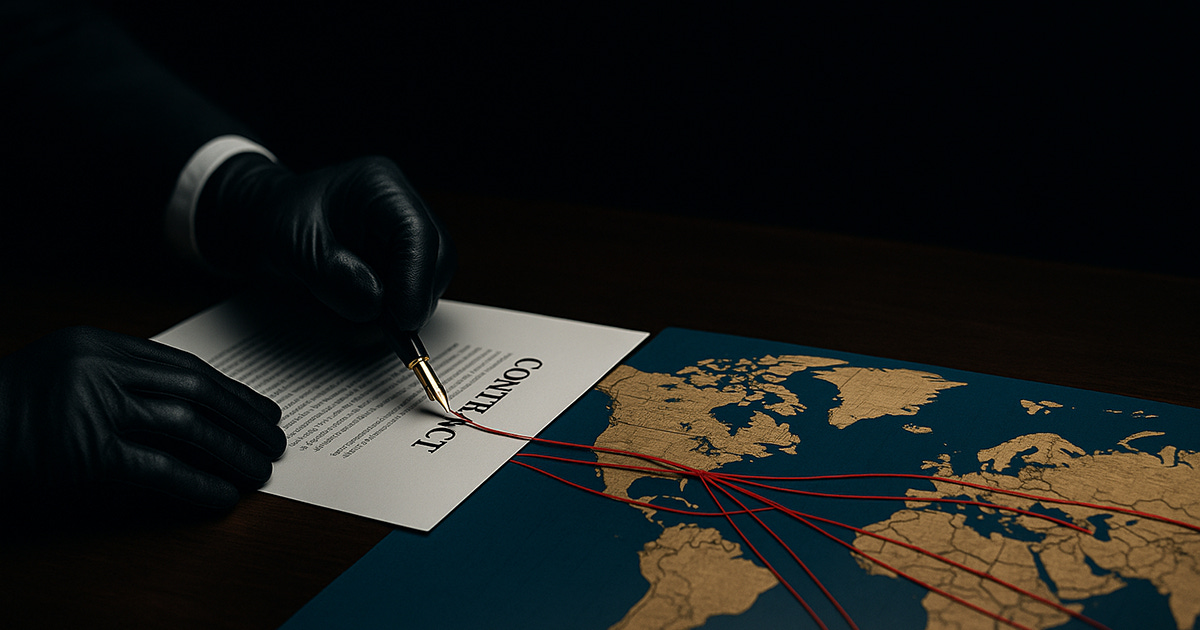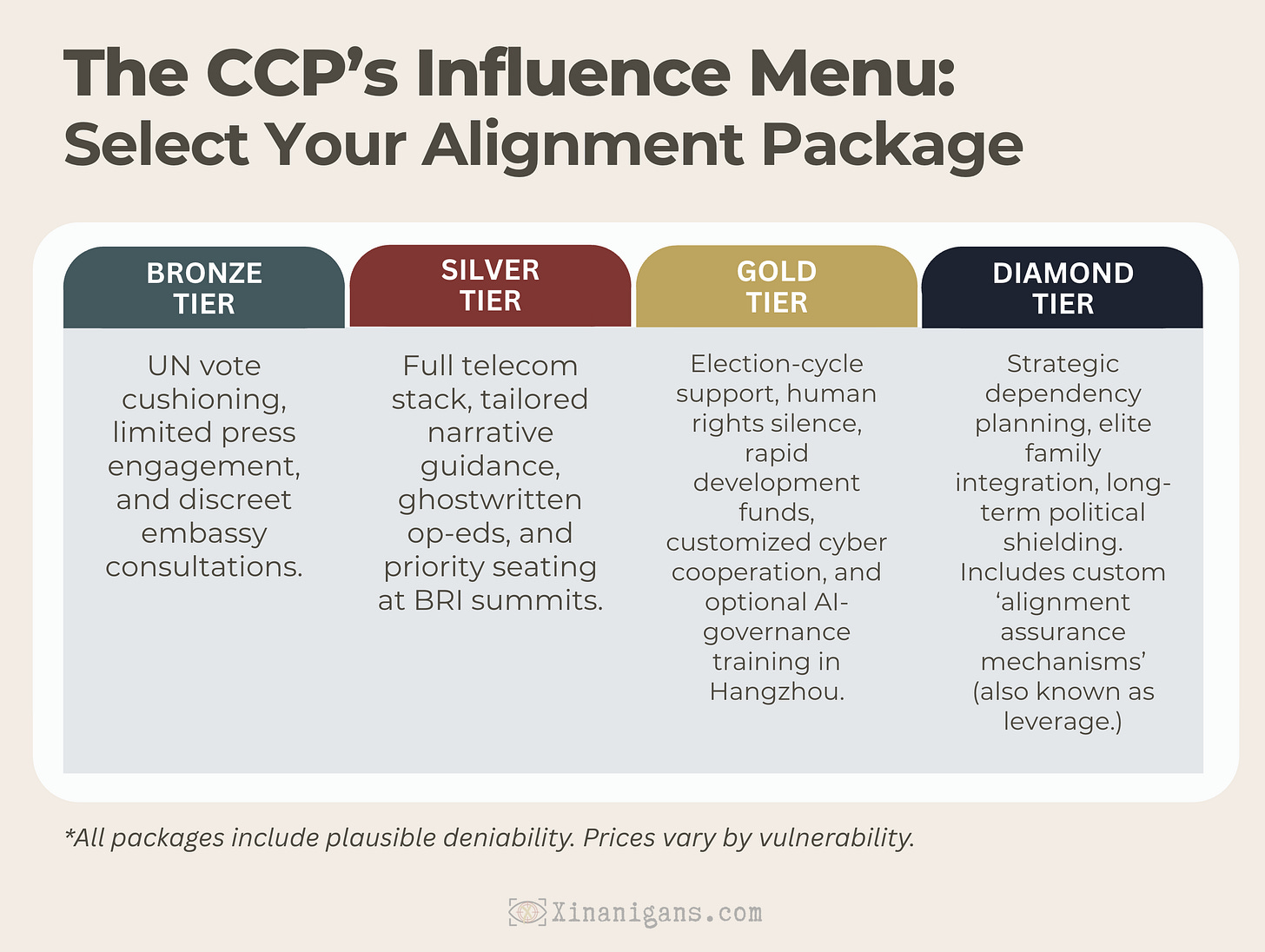Irregular Whorefare: How the CCP Turned Influence Into a Transactional Art
When soft power turns hard, and everyone pretends it’s still diplomacy.
Some countries project power with aircraft carriers. Others prefer infrastructure loans, party-to-party trainings, and carefully cultivated dependencies. But only one major power has perfected influence as a billable service.
Welcome to irregular whorefare: Beijing’s most refined export since silk, now delivered through policy briefings, UN voting blocs, telecommunication backdoors, and the administrative wiring of your government. It operates below the threshold of war, influence engineered to look like consent.
Because what is diplomacy today if not a courtship ritual? And what is Chinese foreign policy if not a long, methodical seduction that ends with the other party wondering whether they ever had a choice?
When Soft Power Turns Hard
For years, Western analysts reassured themselves that China lacked soft power. No blockbuster films, no cultural magnetism, no charisma.
They missed the point entirely.
China pursued access, not affection. And access is easier to purchase than admiration.
Beijing discovered something better than cultural stickiness: elite legitimacy, rapid liquidity, and silent compliance, delivered discreetly and with no ideological paperwork. Call it strategic seduction. Call it soft power. Just don’t confuse it for anything reciprocal.
If soft power attracts, whorefare extracts.
China stopped trying to be liked and started buying what it actually wanted: behavioral alignment.
The Toolkit of Irregular Whorefare
Beijing calls this global business model “win-win cooperation.”
Everyone else calls it influence operations and pretends the distinction matters.
Debt Diplomacy: Infrastructure with a Lease Term
Hambantota was never a warning sign; it was a blueprint. Loans that can’t be repaid become ports that can’t be reclaimed. “Connectivity” becomes strategic tenancy. Sovereignty becomes a line item.
Elite Capture: Loyalty at Market Rates
Political parties, media conglomerates, business dynasties: all suddenly discover that their views on China feel more… harmonious. No bribes, of course. Just well-compensated honoraria, consultancies, and partnerships that come with editorial obedience baked in.
Bureaucrat Reprogramming: Governance by Download
Fragile-state civil servants are flown to Guangzhou for “capacity building workshops.” They return with PowerPoint decks on harmonious governance and a bureaucratic template that nudges their entire state apparatus toward authoritarian efficiency. This functions as administrative annexation by training.
The Digital Silk Rope: Modernization with Strings
Huawei routers, surveillance suites, telecom infrastructure: modernization that doubles as instrumentation. A country upgrades its network and wakes up inside China’s behavioral data pipeline. Congratulations. Welcome to the future. We’ll be monitoring your progress carefully from now on.
Narrative Alignment: Manufactured Consensus
Think tank reports co-authored by Beijing. Academic centers funded into silence. Guest op-eds ghostwritten by intermediaries and recycled in UN citations. Influence doesn’t require censorship when the target pre-edits their own conclusions.
Why China Wins the Bid
Western influence still arrives with parliamentary debates, human rights clauses, and monitoring frameworks.
Chinese influence arrives with cash, speed, and plausible deniability.
▸ Washington demands transparency.
▸ Brussels demands rule-of-law.
▸ Beijing demands only loyalty, and delivers on time.
This is influence stripped of moral theater: prestige without accountability, access without reform, development without democracy.
For many regimes, that’s the point — the sales pitch.
What the Client Really Buys: Strategic Intimacy
China offers something Western democracies cannot: protection without scrutiny.
Teetering regimes get:
financial lifelines,
diplomatic cover,
insulation from human rights condemnation,
and a seat at the international table — no questions asked.
Why invade a country when the Minister of Information already owes you a favor? Why deploy troops when the mayor’s cousin just signed an MOU with Guangdong?
This is voluntary dependency, engineered through perfectly legal agreements.
Plausible Deniability: The True Genius
The engine of irregular whorefare is consent, not coercion. The client says yes. The deal looks legitimate. The world applauds the “win-win.”
Ports are leased, not seized.
Politicians attend workshops, not indoctrination.
Journalists “self-moderate.”
Think tanks “diversify funding.”
Diplomats quote talking points written 6,000 miles away and call it their national position.
Western governments whisper about influence while attending ribbon-cuttings. Multilateral organizations cash the checks. Global South elites praise the infrastructure while muting their microphones on Taiwan.
It’s not secrecy that protects Beijing.
It’s the target’s desire to pretend nothing happened.
Diplomatic Johns and Ideological Pimps
Let’s not moralize: plenty of countries want what China is selling. A development model with no democratic overhead. Legitimacy without elections. Sovereignty without scrutiny. Economic uplift without transparency.
China offers a governance arrangement where accountability becomes optional and obedience becomes convertible currency.
This is a strategic partnership in which ambitious elites trade their autonomy for stability, and an authoritarian superpower invests in their continued rule.
When the Client Can’t Pay
This is the part where the romance ends.
When loans sour, governments turn, or new leaders decide to flirt with Washington again, Beijing doesn’t rage.
It recalibrates.
Silently. Precisely. Punishingly.
targeted tariffs
bureaucratic freeze-outs
cyber harassment
sudden “anti-corruption” leaks
orchestrated online mobs
diplomatic ambiguity
weaponized audits
The relationship concludes in correction, a predictable recalibration.
China only asks for loyalty long enough for dependence to calcify.
We’re All Working the Same Room
There’s a reason leaders praise Beijing on camera and whisper to Washington afterward. They’re not confused. They’re navigating a marketplace where influence is a commodity and sovereignty is negotiable.
The world calls this “engagement.” Beijing calls it strategy. And the system works because both sides pretend the transaction is something else.
China advances through participation alone.
It only needs you to keep showing up.
A Quick Thanksgiving Note
This post is going out just before the holiday, and I want to say thank you!
The support for Xinanigans these past few months has been incredible—smart readers, thoughtful feedback, generous shares, and the kind of word-of-mouth momentum you can’t manufacture. I’m truly grateful.
Wishing you a joyful, restful, and well-fed holiday. May your conversations be sharp, your inbox quiet, and your turkey properly basted.




